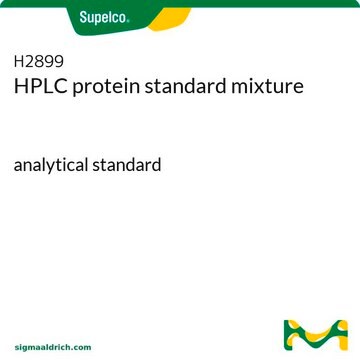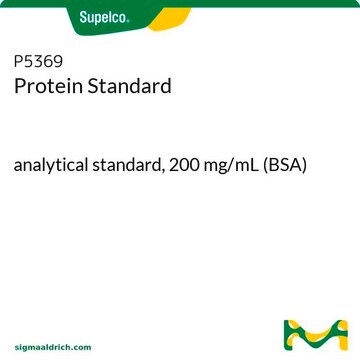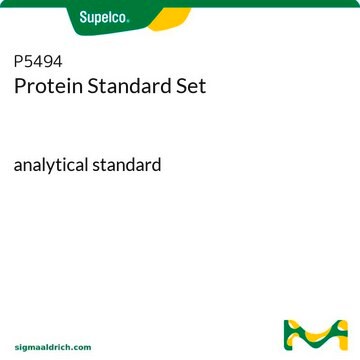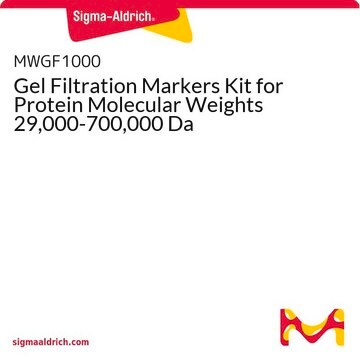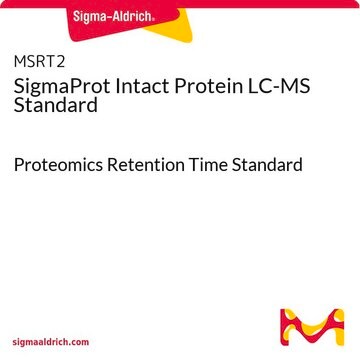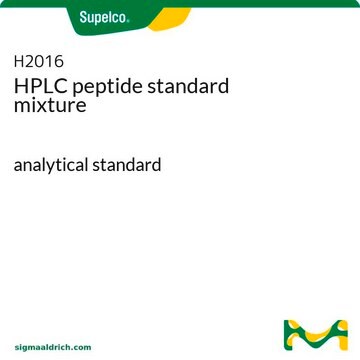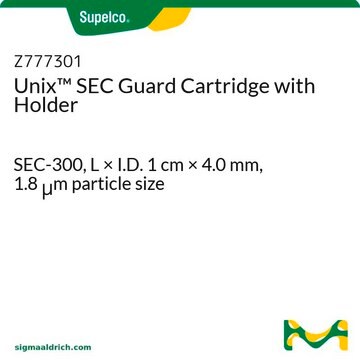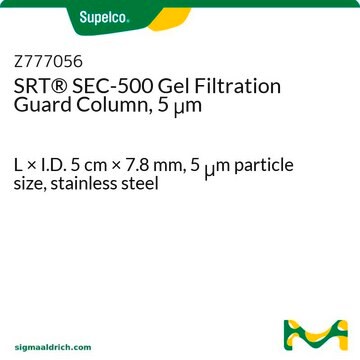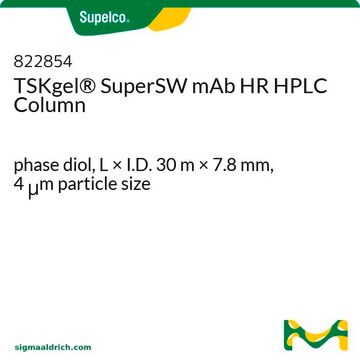69385
Protein Standard Mix 15 - 600 kDa
for size exclusion chromatography
About This Item
Recommended Products
Quality Level
form
solid
mol wt
15-600 kDa
analyte chemical class(es)
amino acids, peptides, proteins
technique(s)
gel permeation chromatography (GPC): suitable
application(s)
clinical
food and beverages
pharmaceutical
format
neat
storage temp.
−20°C
General description
Components
Thyroglobulin bovine MW ~ 670 000 Da
γ-globulins from bovine blood MW ~ 150 000 Da
Ovalbumin MW~ 44 300 Da
Ribonuclease A type I-A MW ~ 13 700 Da
p-aminobenzoic acid (pABA) MW ~ 137 Da
Application
- Evaluation of selectivity and separation efficiency of size exclusion chromatography (SEC) to separate intact proteins by varying flow rate, size of silica particles and pore sizes in the column
- Simultaneous determination of oligomerized and nitrated proteins by size exclusion chromatography-high performance liquid chromatography-diode array detection (SEC-HPLC-DAD)
- Molecular weight separation of proteins by size-exclusion chromatography, formed upon O3 and NO2 induced oxidation, nitration, and oligomerization of bovine serum albumin (BSA) as a model protein
- Estimation of molecular masses of two recombinant proteins— TNF fluorescent sensor (BTN-Kat) and fluorescent sensor-inhibitor (ITN-Kat), by size exclusion chromatography (SEC) to evaluate their ability of binding and neutralizing tumor necrosis factor (TNF) in vitro and further serving as imaging labels for non-invasive analysis
related product
Signal Word
Danger
Hazard Statements
Precautionary Statements
Hazard Classifications
Acute Tox. 4 Dermal - Acute Tox. 4 Inhalation - Acute Tox. 4 Oral - Aquatic Chronic 3 - Resp. Sens. 1
Storage Class Code
11 - Combustible Solids
WGK
WGK 3
Flash Point(F)
Not applicable
Flash Point(C)
Not applicable
Choose from one of the most recent versions:
Already Own This Product?
Find documentation for the products that you have recently purchased in the Document Library.
Customers Also Viewed
Articles
Size-exclusion chromatography (SEC) columns and ready-to-use standards facilitate method development and increase robustness of protein SEC methods.
Characterize mAb monomers, aggregates, and fragments using SEC-UV workflow with Zenix® and Zenix®-C SEC columns.
Characterize mAb monomers, aggregates, and fragments using SEC-UV workflow with Zenix® and Zenix®-C SEC columns.
Characterize mAb monomers, aggregates, and fragments using SEC-UV workflow with Zenix® and Zenix®-C SEC columns.
Our team of scientists has experience in all areas of research including Life Science, Material Science, Chemical Synthesis, Chromatography, Analytical and many others.
Contact Technical Service